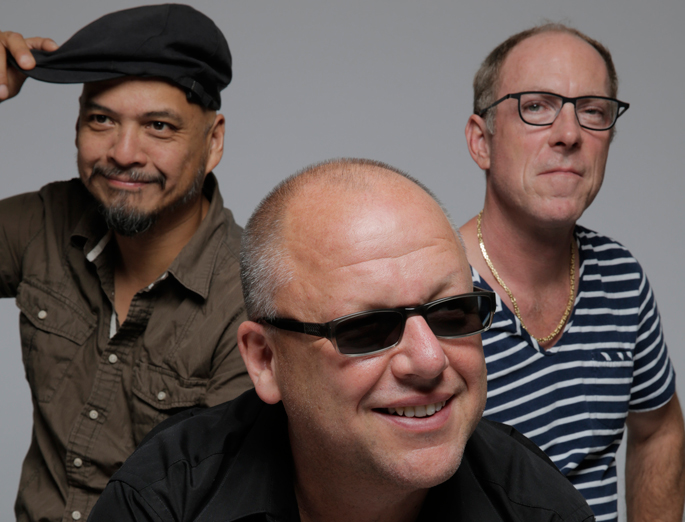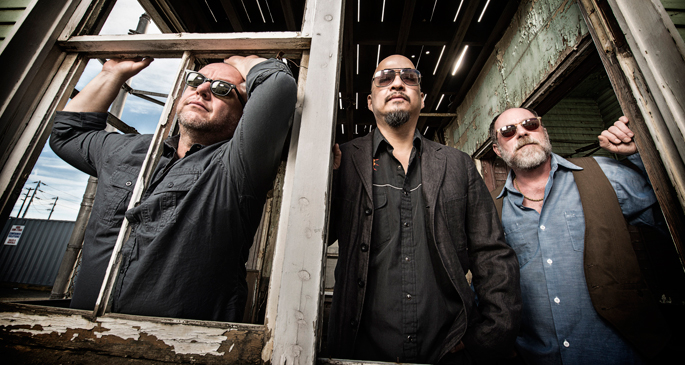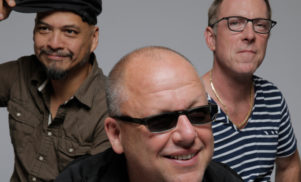I have to admit, I was daunted by this one.
Like just about any vaguely alternative teenager coming of age at the end of the 1980s, Pixies meant everything to me. The intellectual intensity and strangeness of their music was staggering – yet they still functioned on the very basic level of making you want to rock out to the absolute maximum – and they were a gateway drug into all kinds of even odder music: Pere Ubu, Butthole Surfers, surf music, the back catalogue of 4AD, it goes on.
Their image too has been oddly forbidding. Not because they were rock monsters, though – quite the opposite in some senses. They always seemed like some kind of withdrawn, alien creatures, existing slightly removed from the rest of the world in almost every way. Obviously this was partly a projection based on Charles “Black” Francis’s surrealist, sometimes gruesome, lyrics, but it was hammered home by the 2006 loudQUIETloud documentary about their reformation tour, in which they appeared to literally never speak to one another, let alone anyone else.
It was kind of shocking, then, to discover that guitarist Joey Santiago and drummer Dave Lovering were, well, fun. Though they seemed a bit jetlagged and tired having just launched into the promo trek for new album Indie Cindy – the first without bassist/singer Kim Deal – they were relaxed, focused, and didn’t seem to roll out pat answers or get evasive. Joey in particular – munching on a bowl of prawns as we talked – was as far from the awkward and withdrawn character in loudQUIETloud as could be imagined, and in fact was frequently laugh-out-loud funny. They seemed, quite rightly, to be very comfortable with their band’s place in the world.
How’s the promo trip going?
DL: Well we’ve been here [London] a million times, it’s like home.
JS: Yeah, people ask us “what did you do while you were over”, and it’s like “well what did YOU do last night?” What DO you do? You watch TV, you hang out. I’ve just been hanging out. I love it, because it is another home for us. We’re comfy here.
London and the UK took you to its bosom early on, right?
DL: Yeah, it was a different story being here. There was a different feel about absolutely everything once we got here.
JS: Yup, this is where we grew up!
DL: Our record company was here, we spent the most time coming here, it’s our stop off on the way to other places, and really it’s where we’ve done the most shows. Our first proper show was at the Mean Fiddler here in, what, 86, 87, and that was a different story.
JS: The question of why the UK is something that keeps coming up, and the more I think the more I can say that it came down to one man. It’s that one guy that broke us: John Peel. He was the gatekeeper, you get invited to the BBC for a session and it’s “wooooooooo!”
DL: It felt insane to us to be on the main national radio station. There’s nothing like that in the States.
There’s nothing like John Peel here nowadays.
JS: Who’s the guy who took over?
There’s no one person now. Lots of specialist shows, but nobody who runs the full gamut of alternative music. “Alternative” really meant something in the 1980s, before grunge, right?
DL: I guess there was more of a signification then, yes. More of a difference from what was just called “rock”.
JS: One thing was that labels really meant something then. Sub Pop was Sub Pop, 4AD was 4AD, Wax Trax was Wax Trax – they all had this thing that was their own thing. They had clear parameters. Now I dunno if it’s so clear, it’s like “what’s popular out there?” Whatever format works.
DL: But we didn’t think anything special of it back then. It was just what we did.
So you didn’t actively think of yourselves as alternative or outsiders?
DL: Nope.
JS: Nope.
DL: What we did was what we did, there was no thought or formula.
JS: We were incredibly lucky that that worked.
Even once you’d signed to 4AD with its legacy and identity?
DL: Nope, not even. Not even. That didn’t change any of our attitude or anything. It was really exotic to think we were there, it’s a really exotic label, that was crazy – but it didn’t do anything to alter what we were doing, not at all. We did what we wanted, this was what it was. Now we don’t have a record label we still do what we want, it’s the same thing, we’re in a band… no big deal.
JS: They signed us for whatever we were, and we stayed being that.
You certainly got a following that loved the strangeness of Pixies – the surrealism of the lyrics, he imagery – but as instrumentalists, did you ever wish there was more focus on what you were doing?
JS: Nah, I think people loved the music too.
DL: I didn’t think about it.
JS: We intertwined it, there would be lyrics that went “blah blah blaaaaah” and that would be part of the sound.
DL: You could ask me now and I still don’t know any Pixies lyrics to this day. I don’t, I honestly don’t. I have a broad understanding of it, but I don’t listen to lyrics, even in my favourite bands – I like the melody line and the tone. I guess I know some words of Pixies lyrics because I used them as cues along the way. But no, the question means nothing, I just liked the music.
Did you get a sense of how intensely people connected to Pixies as a whole, though?
JS: Just at live shows.
DL: You could see it, sure, but understanding it, not so much. I mean, I understand it, but it’s very hard for us to relate to. If you play in a band it’s always nice to get these acknowledgements, but it’s hard to relate to. We’re too close to it to understand. I can relate it to bands that I love, and put it in context that way, but I can’t see what they see.
JS: It’s nice if people want to have conversations about the lyrics, because they’re surreal. Charles doesn’t know what they’re about himself – really, he doesn’t! They’re there because it sounds like “blah-bliddy-blah-blah-blah” a the right moment. Because it rhymes.
It felt like those songs just poured out of the Pixies machine – you were pretty prolific!
JS: Once a year…
DL: …but that’s all we knew. That’s just the way things were going. When you look back on it, you go “oh yeah, I guess we did quite a lot of stuff,” but then we knew no different.
JS: Pixies was all of our first band. We knew nothing. I thought we actually had to contractually put out an album a year. It’d be coming around and I’d be like, [quavering voice] “oh nooooo, we gotta put an album out!” I really thought that was the contract.
DL: Really, Charles had a lot of songs, and he wanted to record. The only thing I didn’t like was, as each album got quicker and quicker, it got frustrating to record those albums. It was the classic story: the first album, Come on Pilgrim, with Surfer Rosa kind of falling into it, we’d played those songs in Boston since we were a beginning band, we knew them and when we went into the studio we could play them easily. Then of course with each album we’d have new songs, and there was a frustration of wanting to be as perfect as I could be, but I didn’t know this part or that fill because it was so new. With Indie Cindy it’s been different, we’ve been learning and playing those songs for a long time so I had a lot more confidence going in. There was a new attitude going in – this is the first album that was fun, since Come on Pilgrim!
So is everything a lot more relaxed now? Are you making more free time in your schedules than in Pixies Mark 1?
DL: Noooo, it’s the same as it was back then, really.
On the treadmill again?
DL: No, it was never a treadmill – we recorded, did a little touring, recorded, did a little touring. It’s an OK life. And it’s the same now, I think.
JS: I think we’re just appreciating it more now is all.
DL: Yeah we definitely are. We were given a second opportunity that we never thought would happen, so we’re very fortunate and we’re enjoying it as much as we can.
To what degree is there a separation in your minds between original Pixies and the reborn band?
DL: Same shit going down. Same band. Same band.
JS: The differences are: it took 20 years to get to this album, and we’re minus one member, that’s about it. But that’s a big “it”.
DL: Yeah I guess.
JS: It is the same band, but it’s version… maybe… 1.1?
Watching documentaries on you guys, you seemed to struggle with the personal relationships in the band, a lot of stuff got bottled up – do you consciously make sure that won’t happen this time?
DL: Well, that film that I guess you’re talking about really overdramatised things. There were a lot of tricks of editing that dramatised things. They made us look completely uncommunicative, but to us it was never that bad. To us, we’re normal.
JS: We are like that in a way, in a little way – we’re quiet people.
DL: But not in the way the film made it look, it’s not that bad. The thing is, they filmed us for two years, and at the end of that two years they had nothing. We’re the most boring band in the world. I’m not kidding, I’m not! So they just had to use whatever they had to create some interest, and if that’s us scowling at each other then so be it.
JS: They had so little on me, they had to interview me again at the end. Like, “Joe, we don’t have anything on you, in two years you didn’t say shit!” “Oh, OK?” But you know, I’m just… some guy. Who doesn’t talk.
And musically is there a separation, a difference for version 1.1?
JS: I think it is a new thing. [David raises an eyebrow] I think it is – for me it just is. It’s just not the same at all. This new version… well, let’s face it, Kim’s not here. It’s a new one, and the question is what are you going to do with that? Instead of in Music 101 class, we’ve got to be in Music 201. I want that. I want there to be a growth, so it is version 2 in a way.
How would you characterise that in the actual sound?
JS: [laughs] There’s no change!
DL: No change!
JS: There’s no change, and that’s OK – it’s just the way we work together, how we get there, that’s different.
Really? No new influences? Do you ever consciously have influences?
DL: No. And I can say that definitely for myself, because there was a long period where I wasn’t even in groups before we got back together, a long period of stasis. But also, I was only influenced when I was younger. As I get older, there’s nothing I hear that’s going to influence me or change me as a musician or drummer, that’s going to change the way I’ve inherently played since I was a kid. I can’t say if that’s the same for everybody, but mostly as I observe it, nothing influences you when you get old in a profound way. Unless you are consciously trying to reinvent, then maybe, but otherwise no.
Do you agree Joey? You always seemed to experiment with your guitar technique…
JS: [mock shocked] Oh really? At the moment, I’m always trying to go into Steve Reich’s mind. It’ll never happen, but the mental filter still goes there. We came pretty close on ‘Snakes’ though. We were in Wales, and I don’t know if there was a lunar eclipse happening, but Charles and I were just drinking, and we were like [mimes genial backslapping] “HEYYYY! ALRIGGGHT” I had this little portable speaker and we were listening to Steve Reich, and going “hey… woahhhh!” I’d be carrying it everywhere and it would be my thing, having this “d-d-d-d-d-d-d-d-d-wo-wo-wo-wo-wo-wo-wo” playing constantly. So when it came to ‘Snakes’, the opening thing for it, working out the melody, he’d be on a different timezone, I’d be on a different timezone, and then it was like… “we’re Steve Reich!” [collapses in giggles] It was a bitch to edit though, because nobody knows where it starts, and nobody knows where it ends.
Is that something you want to get into further then?
JS: Oh yeah, I would have liked the end of that to just go on and on, because there’s so many sympathetic tones happening, and I want to hear it but there’s no time to hear it. We should change that, we should go to number thirteen with that… keep it going.
Funny, if there’s one thing I’d never have expected from Pixies it’s locking into a meditative groove…
JS: Well the thing about Steve Reich is it’s either relaxing or it’s like a tap drip-drip-dripping on your forehead. It depends on the moment, but I love it.
So back to Pixies 1.1 or whatever you are now – do you all feel like this is your profession again? Is this now a band that tours and records for the foreseeable?
DL: I like to think so.
JS: Yeah, it is. We like it.
DL: I mean, the album just came out yesterday, and we’re on the beginning of this whole [promo] campaign supporting it. But we’ve turned the page on it, and I think it’s on the cards that this is what we want to do.
You’re comfortable with the whole process, the touring, the promotional grind…?
DL: No, nobody’s comfortable with it, but… um… we’ve got to do what we’ve got to do when it comes down to it.
JS: Yeah, we met up with the people from PIAS, the people who are distributing us, just the other day – and I was amazed how many people are in the machine! I just thought, woah, I’d better be in the machine with them, otherwise they’ll think “You fuckers! We spent so much time orchestrating this!” I think they made us promise to visit there so we’d have a guilt trip, actually.
DL: Yeah, heh. There’s a lot of work to be done, there’s a lot of work. But our work, I don’t think it should be seen unless it’s done properly. We owe that to ourselves.
Are you happy fitting into a musical climate that sees you as this hugely influential band?
JS: Yup! Yup!
DL: It’s nice to hear.
JS: It’s nice that our sounds are out there.
DL: I don’t hear it, but friends will tell me, oh, this or that is influenced by Pixies.
JS: If the influence is for people to pick up a guitar or drums, then yeah – fuck it – influence that! When we started we didn’t want to sound like anything. I mean, mine was Bad Company, my influence to pick up a guitar, but we didn’t sound anything like Bad Company! But the people who mention our name… I don’t think Radiohead sound anything like us. And I heard COLDPLAY [he pronounces it very weirdly, “Cowwwwld-ply”] say the same thing, and they’re nothing like us – but if they wanted to play music because they heard us, then great, I love it.
DL: We hear the complement of people saying that all the time, but again, we’re just a band. It’s nice to hear these things, but it’s hard to really parade it and walk around like this [nose in air, swaggering], that’d be silly. But I have to say, we’re extremely fortunate these people have said all these things, because we wouldn’t be sitting here today if it wasn’t for Thom Yorke and whoever saying “yay Pixies”. In hindsight, I’m glad we did split up and things worked out the way they did, because all these complements have obviously helped us.
JS: You just have to sit back and take the complement, like hey, great, thanks, feel good about it. Why do you say “good job” to your kid? Because you want them to feel good. I’m happy to take that – I was married, I don’t want to get criticism anywhere else!








































